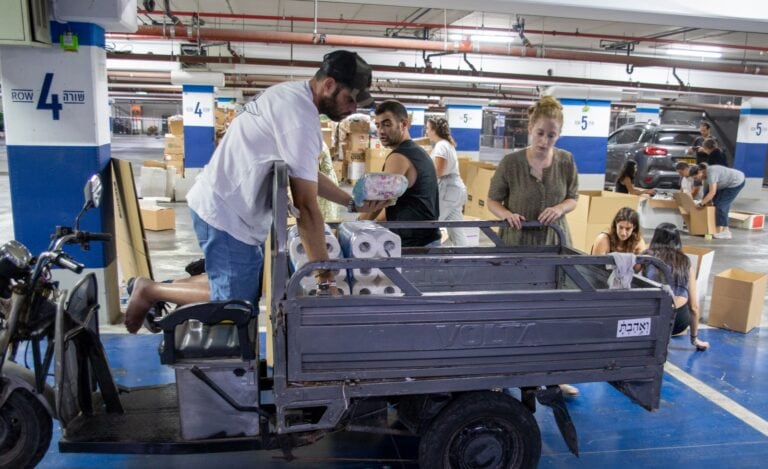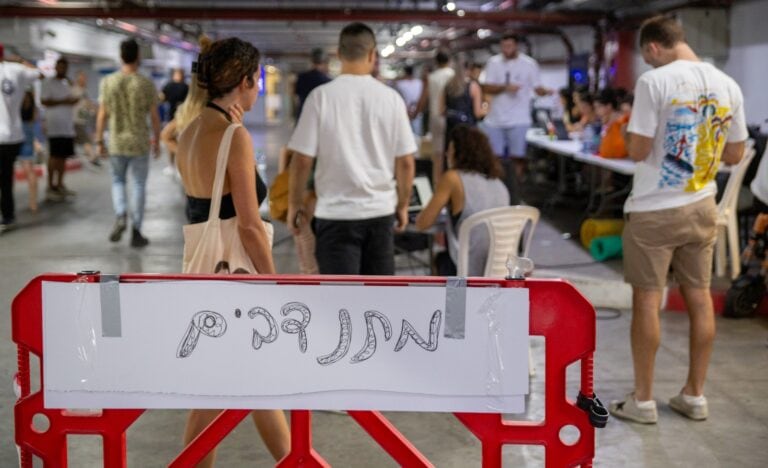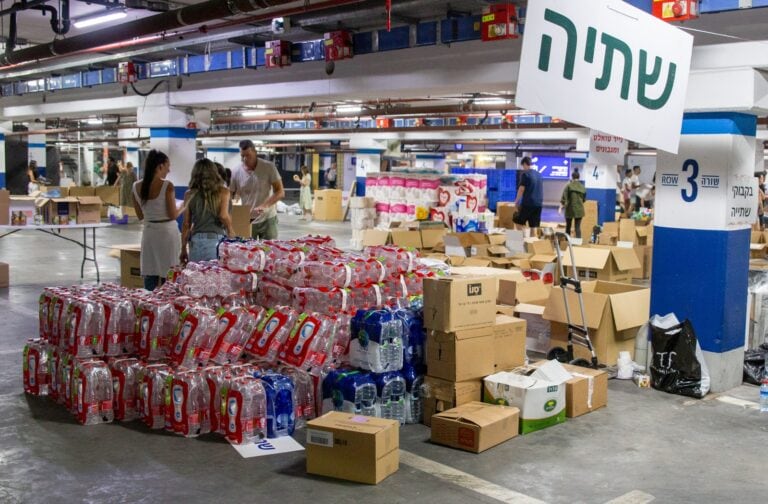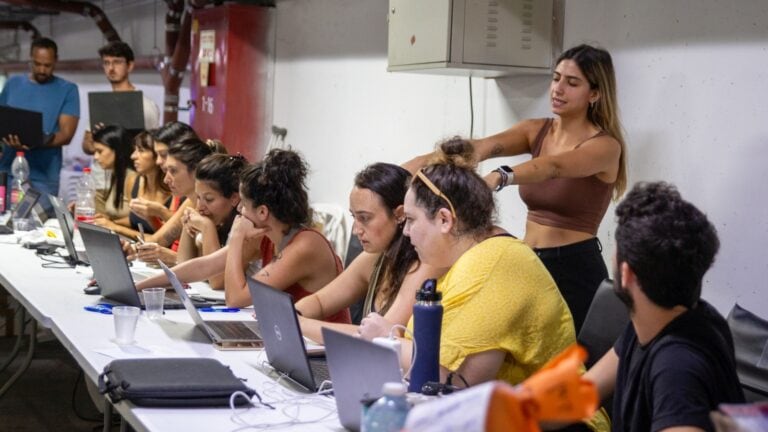While struggling to function with fewer employees due to reserve callup, many Israeli companies pitch in for those who are suffering.
Hundreds of volunteers are toiling in a hot and noisy parking garage in Tel Aviv, to help Israel’s soldiers and survivors of the Hamas massacre on Saturday.
It’s a vast operation that started when a few friends decided to take a trailer loaded with bottles of water to greet soldiers at a railway station as they returned to the south of Israel on Sunday.
By Tuesday, an army of 2,000 people were sorting, packing and dispatching boxes of food, clothes, children’s toys, toiletries, cigarettes and more.
Organizers have been overwhelmed by the generosity of ordinary people desperate to donate their time, money and possessions in the wake of the country’s worst-ever terror attack.
“It’s basically a group of friends who started off wanting to do anything that they possibly could to help the current situation,” said Tamara Ohnona, who works in high-tech and moved here from Canada five years ago.
“We started off on Sunday at Dizengoff Square [in Tel Aviv], and it became way too small way too quickly, thank God. And then we moved to the Namal [Tel Aviv Port]. That also became too small so now we’re over here.”
The volunteers work from 6am to midnight at the Expo Tel Aviv exhibition and conference zone, underground and safe from Hamas’s rockets.
Dangerous places
One of the volunteers, Koral Haham, explained what happens: “We have an Excel with donation requests for soldiers and for civilians. And we try to collect the necessary products for them from the donations.
“We also have a bunch of people willing to drive to dangerous places to get the donations to their destination.
“We have hundreds of people packing the donations, and dozens of people working to organize the orders for donations and to match them between drivers and the destination.
“There are operations like this all over Tel Aviv, and all over Israel.”

This particular operation is run by a group called Eran’s Angels. There’s another, on a similar scale, also at Expo Tel Aviv. And the same across the whole country.
That’s in addition to the thousands of ad-hoc groups that have sprung up on WhatsApp and elsewhere, sourcing everything from headlamps to phone chargers and toothbrushes.
An urge to help
An estimated 360,000 reservists drafted to the IDF in the hours and days after the brutal attacks in which over 1,300 people were massacred.
Many of the soldiers arrived with little more than the clothes they were wearing, with no time to pack, to Army bases that were totally unprepared for such a huge influx.
There are also thousands of victims who have been evacuated from their homes in the South and need day-to-day basics, such as food, clothes, mattresses and diapers.

Marva Kafri was evacuated from her kibbutz on the Lebanon border, where Hezbollah is now firing rockets, down to the Kinneret. She traveled to Tel Aviv to help and says she has seen incredible generosity.
“There’s a shortage of sleeping mats,” she said. “I’ve seen people who have brought in their own mats that they’d use to sleep in their own shelter and give them to the soldiers.
“Everyone has an urge to help and pack so it gets a bit messy, but it’s great. I have seen thousands and thousands of packages being sent out.”
Her partner Guga Ben Schachar said: “People from all sorts of places in the army are asking for help. People come here and donate themselves by volunteering, by giving stuff that they have at home and by buying stuff for the soldiers.”
‘I need to contribute’
There are boxes piled high with donated toys and teddy bears, catering packs of tuna, bottles of shampoo, six-packs of soft drink.

The pick-and-pack teams here don’t have the tech that runs an Amazon delivery depot. It looks chaotic, but they get the job done.
Erad Ben-Hama said: “I’m just a normal citizen, volunteering like everyone here. Four days ago a bunch of friends went to the train station to take water to the soldiers.
“We started with a small trailer with the 400 liters of water. It snowballed into hundreds of people. Today we have something like 12 trucks, maybe 15 trucks.”
Anita Kaneti, who works for a startup in product marketing, has been taping cardboard boxes together since 7am.
“I’m here helping because I believe that our country’s protecting us and we need to help people that are endangering their lives for us,” she said.

Maoz Lakovski, another volunteer, said: “I’m here because I want to help my people. I was at home. I’m no longer in the reserve forces and I wasn’t drafted. So I felt I need to volunteer, I need to contribute to the country.
“The requests come in and then we try to match them. We got one, for example, from a very secret army unit that needed 400 pairs of underwear,” Lakovski said.
“It’s like a marketplace. There is supply and demand. Supplies from all the great people, also from retailers and big donors, and then there’s the demand side.
“Demand comes from the field, from the units. We try to do the matching. We don’t always get everything we need to deliver but if we don’t, we join forces with other organizations like ours.”
Pull quote: “It’s basically a group of friends who started off wanting to do anything that they possibly could to help the current situation.”
Miri Collins, another volunteer, said: “We’re receiving donations from everyone. They just want to give and give and give.
“We’re sort of the lucky ones being in Tel Aviv. And if we can help the people in their time of need, that’s what we need to be doing.”
Nearly 2,000 volunteers
Eran’s Angels had to scale down volunteer numbers on Wednesday after moving to its underground venue.
“Yesterday we had close to 2,000 people,” said Ohnona. “Today we’ve asked to make it a little smaller, because there’s just so many people that could fit in this area. But I’m assuming we’re going to go up to at least 500 today.
“Thank God, we’ve been sending so much that we’re low on stock and we need donations.
“Goods are best, money is also always acceptable. Anything for the soldiers in terms of toiletries, anything in terms of socks, underwear, cigarettes and food, ideally non-perishable food, is good and anything you can possibly think of at the moment,” said Ohnona.
There’s no need for secondhand clothing, she added, “but if it is army clothing, that’s a different story.”
You can volunteer or drop off goods here or donate money here.
